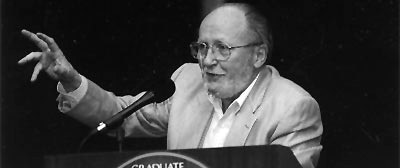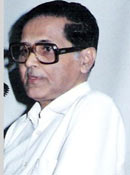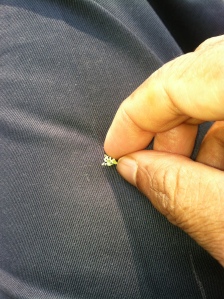
I dedicate this post to my beloved professor Late James Carey at Columbia University Graduate School of Journalism.
___________________________
I want to write about qualities of some exceptional people who made me what I am today.
I’ll be writing about exceptional teachers. I’ll be writing about exceptional writers, poets, musicians and artists and filmmakers. I’ll be writing about exceptional leaders. I’ll be writing about exceptional women. I’ll be writing about exceptional players. Of course, I’ve written about quite a few of them already. You can look them up here.
Today, I’m going to write about exceptional qualities of teachers — those who transformed me from a piece of rock into a … whatever I am now. You can fill in the blank. At least, I’m not the same-old, boring piece of rock I used to be back in those days — before these exceptional teachers touched me with their magic, with their touchstone.
I remember way back when, in my Scottish Church School days in Calcutta, a teacher called me “pathor.” In Bengali, it means rock. Of course, he mocked my name with his usual, jovial slant. But I took it rather seriously (I think). I decided I’d show him and the rest of the world that I was not a pathor.
Unknowingly, Mr. Samar Kaviraj or “Kabiraj Babu,” the jovial teacher who dedicated his life for his students, inspired me to transform from within. I lost touch with him when he left our school, perhaps for a better-paid position somewhere else. But I have remembered his fun slants and his fond affection all my life. I also remember him for his devotion to sports and love for modern Bengali poetry. He was the one who introduced me to Sukanto Bhattacharjee, poet genius who passed away at the age of twenty one. He also inspired me to learn chess, as well as classy cricket. Slants therefore…who cares?
If you think of it, slants go hand in hand with affection in a place like India or Bengal where a deeply-entrenched colonial education is still in place. Nobody minds if a teacher makes fun of a student once that teacher also shows care, affection and respect for the student. At least, I didn’t mind when I was a student. Of course, I had my share of horribly abusive teachers too whose only qualification was an exceptional dexterity to punish. I’ve talked about it in one of my blogs. You can read it here. (Warning: that’s graphic violence.)
But here, I’m going to remember some truly, positively exceptional teachers I’ve had both in Bengal, India and later in the U.S. I often think about them with a deep sense of admiration. I’ve considered them as role models all my life. I’ve tried to analyze what qualities have made them so exceptional and inspiring.

I’ll try to list ten such qualities here. I do not believe it is possible to rank these qualities: no one is more important than the others. Plus, ten is just a convenient number. I’m sure we can find many more qualities for teachers we’ve remembered in our lives. I’m only scratching the surface of this ocean full of pearls.
1. Definitely, respect for students is a very important attribute. In a place like India where colonialism (read: Gandhi’ism) is still in vogue, it’s very common to find a mindset that a teacher only demands respect from the student and it is never reciprocal. On the other hand, here in America, I found professors who showed me how mutual respect was an essential element in the process of learning. In Calcutta too, even though they were few and far between, I had teachers both in high school and then in college and university who showed that they understood the importance of paying respect to their students. And of course, they were highly respected too. Like I said, respect is mutual.
2. Encouragement. — I’m tempted to say: see above. Really, you could almost replace the word respect with encouragement, and you would know what I meant. Particularly in a very colonial, learning-by-rote education system, teachers encouraging students as opposed to putting them down are rare. And that rarity makes it precious. School teachers, college teachers, university teachers and especially the most important teachers at home — parents — would make that critical difference in how they would treat their students. Would they find some kind words, some patience, some words of cheer? A small word of encouragement from the teacher has always lightened up my desire to learn, and to do better in the otherwise dreadfully boring and backward, feudal education system in India.
3. Teachers who never show off. — I’ve always found it a very important quality. Students are smart to figure out how much the teacher knows and how much he or she shows off. They know the difference between an empty vessel and a full one. A teacher like Prof. Robert Mohlenbrock or Prof. Carey never showed off; yet we were glued to their classes. At Scottish Church School in Kolkata, math teacher Shyamadas Mukherjee never showed off; yet, even the worst rogue student during the most turbulent time when we grew up in the midst of street bombing and police brutality never cut his class. There would be no cat calls in his forty-five-minute periods.

4. Practice equality for boys and girls, rich and poor, brilliant and average students. — Of course, I never experienced coeducation until my university days in Kolkata. But when I did experience it, finally, one important attribute of a teacher quickly came through. Teachers mocking students coming from poor families was commonplace. Teachers ridiculing average and below-average students, and that too, in front of the entire class was commonplace. In college and university, praising brilliant male students for their achievements and at the same time bypassing brilliant female students for an equal or higher achievement was commonplace too. Exceptional teachers — those I thought were the best — never practiced such inequality. I can definitely mention Prof. Ray Stotler and Barbara Stotler at Southern Illinois University. In Calcutta, we had our plant pathology professor Dr. Purkayastha who was exceptional.

5. Inspiring to question and challenge. — Very few teachers in India allowed us, encouraged us to question and challenge either the subjects they taught or the way they taught them. Yet, ancient religious texts in Hinduism were full of teachers who would always admire and even reward their students for questioning and debating. A dark, medieval, feudal, “Brahminic” (upper-caste-dominated) era followed by a British-imposed colonialism later sustained by Gandhi and his hand-picked successors choked the young mind in India of free thinking. Chemistry teacher Nitya Ranjan Sengupta or Bengali teacher Amiya Madhab Roy back in my Scottish Church School days brought great reassurance that respectful questioning could be an important aspect of learning. Prof. Lawrence Matten at Southern Illinois University was exceptional the way he encouraged me to question — even him!
6. Sense of Humor. — Absolutely essential element of a teacher to be exceptional. A warm smile, a fun story, or jokes without being out-of-control or crude bring the teacher close to the student. You know how to poke fun in teaching? You got a sold-out crowd, instantly! You are a Nobel Prize winner and you don’t know how to smile? Sorry, you’re not going to win our most popular teacher contest. Ever!
7. Hands-on Learning. — Abstract, imaginary examples never score points with students. You’re teaching algebra? Okay, use real-life examples to prove Pythagoras. You’re teaching history of British colonialism and partition of Bengal and Punjab? Okay, bring a couple of ex-refugees (like, my parents-in-law) to speak to your students. You’re talking about global warming? Okay, find some flowers that are now blooming earlier-than-usual. You’re teaching Shakespeare? Okay, do a small drama casting your students as Anthony, Cleopatra or Shylock. (Just don’t enact the blood and flesh part). You’re teaching journalism and how to interview people on the street? Alright, give the student editor a tape recorder and her assistant editor a camera (or, today, just ask them to use their i-Phone). You’re teaching ecology and evolution? Don’t tell students that this year, they’re not important for the test. Rather, bring them out on field trips and show them ecology and evolution in a real-life situation. Take them out to the botanical garden or zoo. They do it here in America all the time. Why can’t you do it in Calcutta, Bombay or Dhaka?
8. Make Tests Tasty, Not Testy. — We had our share of nightmarish tests made up by teachers who never knew how to teach; they were only good at making things impossibly hard. Some of us threw up taking tests. Some of us had high fever or muscle cramps the day before. Some others — otherwise good students — did miserably just because of the extreme uncertainties of the test. For some of our teachers, grading tests was almost like a sadistic pleasure — complete with the chain saw and all. As if they were being paid to show how merciless and cruel they could be. Is slaughtering your students on a slaughter-pin otherwise known as an exam fun for you? It certainly is not for me! I remember I regularly got a 100 out of 100 in my fourth or sixth grade in math, history or geography, and a 96 in chemistry and a 92 in biology in my final year in high school. All these teachers grading those tests were exemplary teachers. They made up their tests exactly the way they taught the subjects in class. Other teachers or board exams in India? I felt lucky every time I passed. And my wife got an absent mark on her B.Sc. zoology test, only to miraculously locate the head examiner University of Calcutta appointed, to salvage her lost exam and get reexamined! A couple of my own students from rural Bengal were not lucky: their exams were never found!!
9. Students Do Want to Learn. — Contrary to what many teachers think, students both in India and USA — the two countries I’ve seen up close — actually have a strong desire to learn. Students’ minds are like blotting papers: they soak education up. Their minds are like a soft piece of clay: it’s up to the teachers to decide if they want to mold it artistically or burn it harshly to a black, hard lump where nothing ever gets absorbed. Teachers who have the quality to artistically, delicately, softly transform that piece of clay like a kneaded rubber into a beautiful piece of art are exceptional teachers. That transformation happens with a deep sense of care and emotional attachment with the student: to consider the student as a man or woman with potential and possibilities. That feeling is divine, idealistic and spiritual too! The teacher who has mastered that craft of molding with care and love and respect — to instill imagination and confidence into that soul yearning to learn is the greatest teacher. Poor, grossly-underpaid teachers with absolutely limited resources could turn out to be some of the best teachers of your life. I feel fortunate I’ve had seen some of them in my Calcutta days.

10. Did I say it before? Never hurt them. — A teacher is there to heal and not hurt. A teacher is there to compliment and not ridicule. A teacher is not there to punish. He is there to care and love and inspire. I found Kalyan Mandi, botany professor at Calcutta’s Presidency College a symbol of kindness and compassion.
Some of the best teachers I’ve had in my long years as a student — both in Bengal, India and here in America — carried with them the above exceptional qualities. I carry them in my mind as my role models. They’ve made me, me. These artisans have changed a piece of rock — the pathor — into a somewhat refined object of a somewhat good-looking entity.
I’m happy I’ve known these exceptional teachers.
In deep gratitude,
Partha
Brooklyn, New York
###

This is beautiful and well written, but if I may have the audacity to add another, I feel it encompasses all the rest:
Love the students! Not in a weird or perverse way, of course, but as you would your own children! Be genuinely and truly happy to see each and every one of them, every day. And the difficult ones? Love them more! They need it more! Two decades have taught me that those are the students who come back to see you for years, invite you to their weddings, and show up at your front door to introduce you to their own children. I cannot stress enough that a great teacher loves her students even more than her subject matter, or the art of teaching itself! This, to me, is the key to changing lives.
Humbly offered,
G. G. R. “Miss Rugg”
“Love the students.” Yes, some of us did that too. And got some back. But when the society becomes so pathetically power- and profit-driven, all love and literature languish behind the lofty lure and largess. Love lavishes in Bollywood.
Politics is/was d LasT RESORT of d Scroundrels! Thats ‘passe’.
NOW, Education System is d LateEst Resort of d WorsT SScroundrelsSsssss…. Just lOOk A0.
Teaching is Minimally Science, Maximally ART!
Art Demands APTITUDE.
But NO APTITUDE is in d YardSticks of Selecting a TEACHER, @least in INDIA.
In Medical Education, in India, Except a V Few n FaaaR Btwin XceptiONss,
Only Used Less, xxxx People r Manning( shud i say woEmanning!) d System.
General Education Dismal! Abysmally low iStatus. 😦 😦 😦
Wadever, said n Done:
Guru(Teacher)
Brahma(Creator),
Guru Vishnu( Nurturer)
Guru Devo(God) Maheshwara ( Destroyer)
Guru Sakshat( Living) Param(Ultimate) Brahma,
Tasmayee Shrii Gurabe Namah!
( Thy, Salute U )
Thank you for writing. However, I do not agree with what you said in the first line.